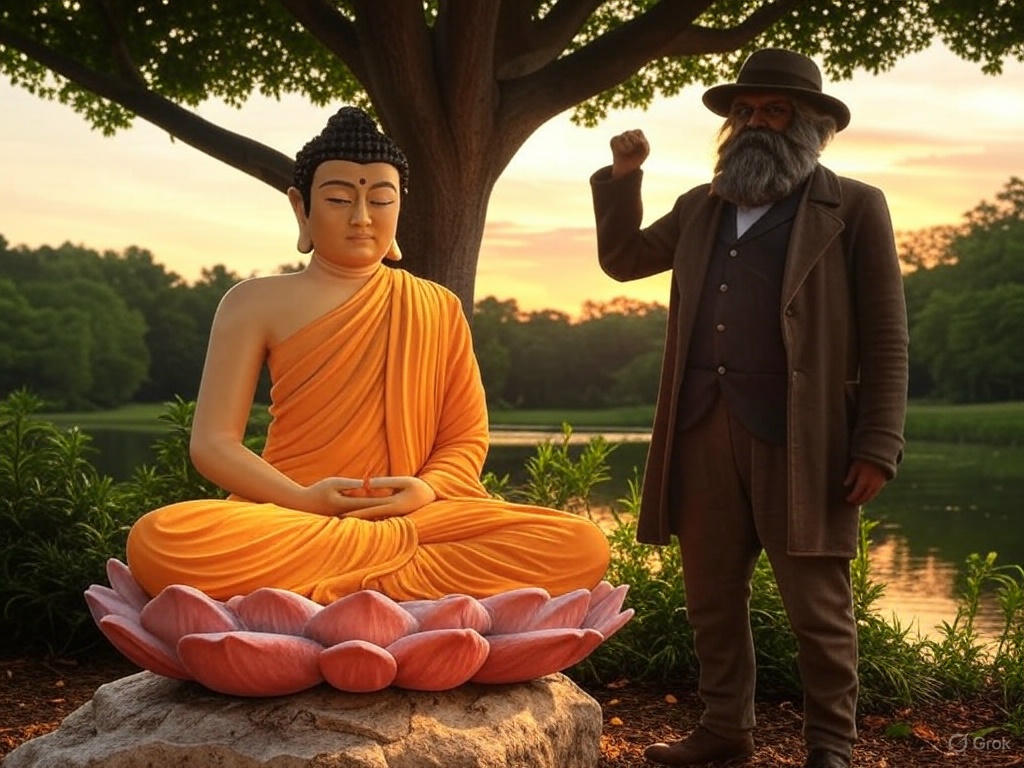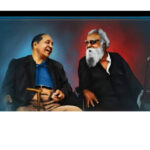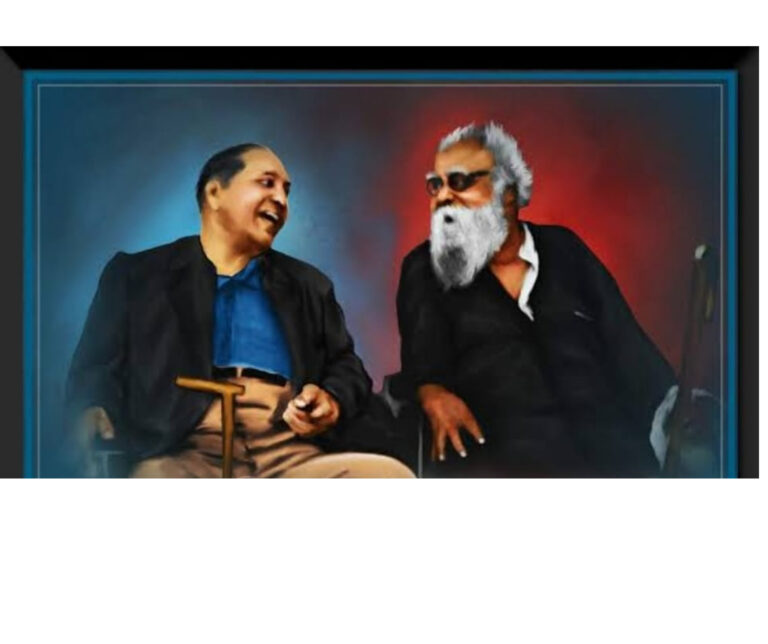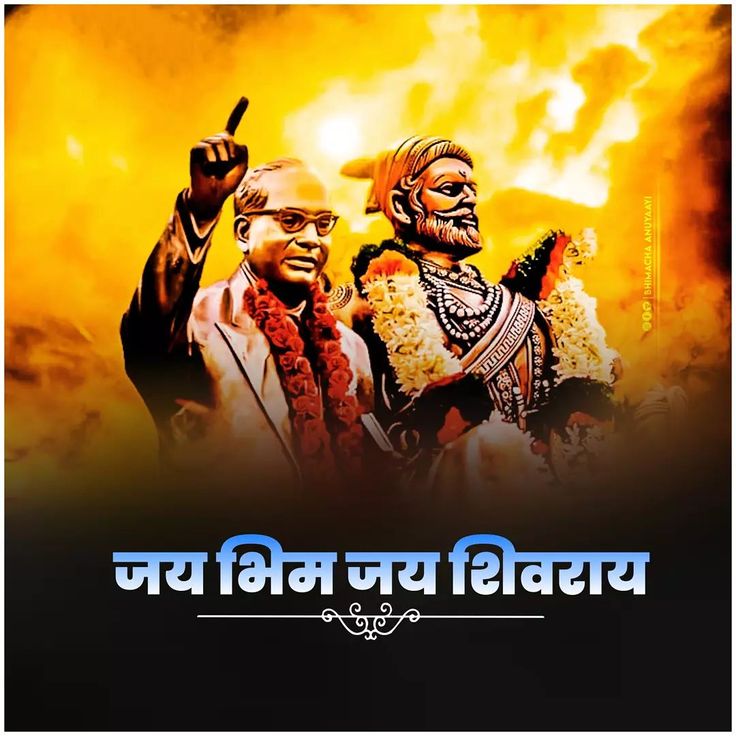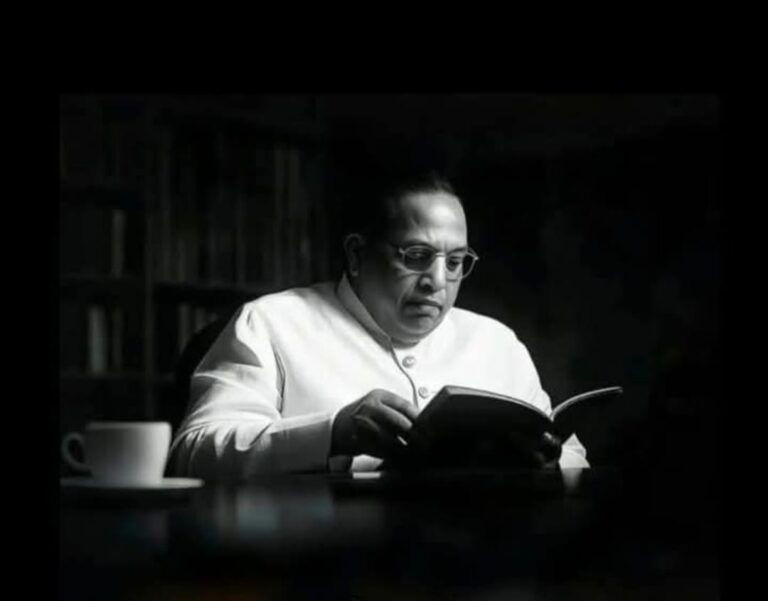What happens when a monk meets a revolutionary?
At first glance, Buddha and Karl Marx seem like polar opposites—one a serene spiritual teacher, the other a firebrand revolutionary. Buddha sought liberation from suffering through inner peace; Marx fought for liberation from oppression through systemic change. Yet both were radical thinkers who challenged the status quo, rejected hierarchies, and envisioned a freer, fairer world.
In today’s hyper-capitalist society, where billionaires fly to space while millions struggle for rent, where anxiety and inequality soar, we need both perspectives. What if the path to real change requires both inner transformation and systemic revolution? What if Buddha’s compassion and Marx’s fury are two sides of the same coin?
Let’s explore where these two giants agree, where they clash, and why their unlikely alliance might be the key to a better future.
Who Was Buddha? The Rebel Monk
Before he was “the Buddha,” he was Prince Siddhartha Gautama—a man who abandoned wealth and power to seek truth. His awakening didn’t happen in a temple but under a tree, through relentless self-inquiry.
Buddha wasn’t a god; he was a philosopher of the mind. His core insight? Suffering (dukkha) arises from craving and ignorance. His solution? The Middle Way—neither indulgence nor extreme asceticism, but mindful awareness.
But Buddha wasn’t just spiritual. He rejected India’s caste system, welcomed outcasts into his Sangha (monastic community), and dismissed empty rituals. His teachings were radically egalitarian: “Work out your own salvation. Do not depend on others.”
In a world obsessed with wealth and status, Buddha’s message was revolutionary: True freedom starts within.
Who Was Karl Marx? The Firebrand Thinker
Marx wasn’t just a bearded philosopher scribbling in the British Library—he was a revolutionary who believed ideas were worthless without action. His diagnosis of society? Capitalism is a machine that grinds workers into exhaustion while enriching a few. His prescription? “Workers of the world, unite!”
Marx saw history as a series of class struggles. The bourgeoisie (owners) exploit the proletariat (workers), creating alienation—people feel disconnected from their labor, their humanity, even each other. His vision? A classless, stateless society where people collectively own resources.
His famous quip: “Philosophers have interpreted the world in various ways. The point, however, is to change it.”
Marx wasn’t about meditation—he was about movement.
Points of Convergence: Where Buddha and Marx Shake Hands
Despite their differences, Buddha and Marx agreed on surprising things:
- Both Were Anti-Establishment
- Buddha rejected Brahmin priests and caste.
- Marx despised capitalists and monarchs.
- Both were disruptors.
- Both Diagnosed Suffering—Just Differently
- Buddha: Suffering comes from attachment.
- Marx: Suffering comes from exploitation.
- Both said: The current system is broken.
- Both Championed Equality
- Buddha’s Sangha ignored caste.
- Marx’s communism ignored class.
- Both Valued Community
- Buddha’s monks relied on collective support.
- Marx’s workers were stronger together.
- Both Wanted Liberation
- Buddha: Freedom from mental chains.
- Marx: Freedom from economic chains.
Points of Divergence: Where They Would Disagree
- Inner Change vs. Outer Revolution
- Buddha: “Peace comes from within.”
- Marx: “Smash the system!”
- Violence?
- Buddha: Nonviolence (ahimsa).
- Marx: “Revolution is sometimes necessary.”
- Materialism
- Buddha: “Desire is the root of suffering.”
- Marx: “Material conditions determine consciousness.”
- Speed of Change
- Buddha: Gradual enlightenment.
- Marx: Immediate revolution.
Hypothetical Debate:
- Marx: “Meditation won’t feed the starving!”
- Buddha: “Anger won’t bring lasting peace.”
Out-of-the-Box Thought: What If They Met in 2025?
Picture this: Buddha and Marx in a cafe, sipping tea (or smoking a cigar, in Marx’s case).
Topics they’d debate:
- Social Media & Consumerism
- Buddha: “Your cravings keep you enslaved.”
- Marx: “Algorithms are the new factory owners.”
- Modern Work
- Buddha: “People are burnt out from chasing promotions.”
- Marx: “Gig workers are the new proletariat.”
- Mindful Activism?
- Could protests be both fierce and compassionate?
- Examples: Gandhi, modern climate activists.
Why This Matters Today
We live in a world of:
- Spiritual poverty (loneliness, anxiety).
- Material poverty (rising inequality).
We need:
- Buddha’s wisdom to heal our minds.
- Marx’s fire to fix broken systems.
Question for readers: Can you fight for justice without burning out? Can you seek peace without ignoring oppression?
Ambedkar’s Comparison of Buddha and Karl Marx
1. Using Force: When Is It Okay?
Ambedkar looks at how Buddha and Marx wanted to help people. Both wanted to remove suffering, but their methods were different.
- Buddha taught non-violence, but said sometimes force is needed for justice. For example, punishing a criminal to protect others is okay if the intention is good.
- Marx believed poor workers should use violence to fight rich oppressors.
Ambedkar asks: If we allow killing in wars or punishments, why not stop greedy rich people who make others suffer? But he warns—too much violence can create chaos.
2. Good Leadership vs. Forceful Control
- Buddha believed in equality. His group of followers (Sangha) had no single leader—all were equal. He even refused a gift from his mother unless everyone got it!
- Marx’s communism needed strict rulers to force equality.
Ambedkar says: Fear doesn’t last. A good leader rules by fairness, not force. He tells a story of a king who lost power when he stopped being fair.
3. What Happens After Revolution?
Communists say the government will one day disappear. But Ambedkar asks:
- When? Nobody knows.
- What will happen then? If people don’t choose to be good, society will break down.
Buddha’s solution: Change people’s hearts first. Teach kindness and fairness, so no police or armies are needed.
4. Why Buddha’s Way Is Better
- Marxists dislike religion, but Buddhism is different. It doesn’t tell people to stay poor—it teaches how to earn money honestly and share it.
- Buddha’s Sangha was like a small communist society—no rich or poor, no rulers—but it worked without force.
Ambedkar’s Final Message:
“Marx’s way uses fear. Buddha’s way changes minds. If people choose to be good, the world will be fair and peaceful forever.”
Conclusion: Two Paths to a Better World
At first glance, Buddha and Karl Marx seem like complete opposites—one taught inner peace, the other demanded revolution. But both wanted the same thing: to free people from suffering. Buddha focused on changing minds; Marx focused on changing systems.
Today’s world needs both. We need Marx’s fire to fight unfair systems, where billionaires get richer while workers struggle. But we also need Buddha’s wisdom, because anger alone burns us out, and no revolution can succeed if people’s hearts stay selfish.
Ambedkar, who studied both, answered: Buddha’s way is better because it changes people from within. A society built on force will always need more force to survive. But if people learn compassion and fairness, real change can last.
So, what’s the solution? Fight for justice, but don’t lose your humanity. Protest like Marx, but reflect like Buddha. Demand fair systems, but also build a fairer self.
FAQ Section
1. What was Ambedkar’s main critique of Marxism?
Ambedkar agreed with Marx’s goal of equality but argued that communism focused only on economic equality while ignoring freedom and brotherhood. He believed true justice needed all three—equality, liberty, and fraternity (unity)—which he found in Buddhism.
2. Did Buddha support violence like Marx?
No, but Buddha said force could be used for justice, like stopping a criminal. Marx supported the revolution to overthrow the oppressors. Ambedkar warned: Too much violence creates chaos, not change.
3. Why did Ambedkar prefer Buddha’s way?
- Marx’s communism needed dictators to force equality.
- Buddha’s Sangha was equal without rulers—people chose goodness voluntarily.
Ambedkar said, “You can’t build a fair society only with laws and guns. Minds must change first.”
4. Can Buddha and Marx’s ideas work together today?
Yes! Example:
- Marx’s fight against unfair systems (like low wages).
- Buddha’s mindfulness to avoid burnout and hatred in activism.
Ambedkar’s dream was this mix: “Demand justice like Marx, but with Buddha’s compassion.”
5. What’s the biggest lesson from this comparison?
Lasting change needs both:
- Outer revolution (fair laws, rights).
- Inner revolution (kindness, non-greed).
As Ambedkar proved, a society built on force will fail—but one built on wisdom can last.
Ask Yourself:
“Would I rather be forced to be good, or choose to be good?” That’s the difference between Marx and Buddha.
Final Thought:
“The best revolution starts inside—then changes the world.”
What do you think? Can we mix Buddha’s peace with Marx’s fight for fairness? Share your views!
